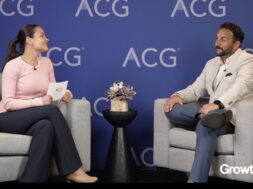To Manage Your Money Amid Tax Reform, Channel Your Personal CFO
In addition to analyzing how tax reform will impact corporate strategy, private equity personnel should consider how it will affect their personal financial plan.

Whenever there is discussion in Washington, D.C., about tax reform, the first action good CEOs will take is to consult their CFOs about the potential impact of any change to the tax code. Private equity and corporate executives across the country are currently deciphering how a tax reform bill—including changes to the treatment of interest deductibility and carried interest—could affect their bottom lines.
In addition to analyzing how a tax reform bill could affect future corporate strategy, private equity personnel need to evaluate its impact on “You” Capital LLC—that is, one’s personal wealth.
As the CEO of “You” Capital, it is important to channel one’s personal CFO to determine any impact on personal wealth. The effects could be wide-ranging: Changes to the tax structure for personal, corporate and pass-through entities will all impact an individual’s financial plan.
Tax filers will feel the impact of any changes to the tax code every April, but less attention is paid to how a reform bill would impact other parts of the wealth management picture year-round. Everyone will have an individual strategy, but not viewing tax reform holistically will lead to a subpar financial outcome.
Below are some topics that private equity professionals should consider as they evaluate their personal finances amid the ongoing tax reform debate.
Changes to the tax structure for personal, corporate and pass-through entities will all impact an individual’s financial plan.
Cash Flow Planning
Managing cash flow and creating a strategic plan for allocating money toward savings, spending and recurring expenses can often be tricky given the private equity compensation structure. The potential impact of tax reform creates a layer of complexity that could alter a private equity fund’s cash flow and, in turn, a PE employee’s personal cash flow. This complexity offers an occasion to create or evaluate a plan.
To create a cash flow plan, evaluate the timing and magnitude of anticipated cash flows and take into consideration changes that could result from tax reform. After estimating these amounts, set a goal for how these funds will be used. Staying disciplined makes it possible to weather both good and bad times ahead. Although no one has a crystal ball, planning during this time of change is an opportunity to position oneself well should a tax reform bill become law.
Investment Management
Any major financial change, including tax reform, should always trigger a reassessment of one’s personal investment portfolio structure. Changes to the tax code can affect the entire process of constructing the portfolio.
When reevaluating the plan, keep in mind that the appropriate mix of cash, bonds, stocks and other assets—private equity or real estate, for example—will drive about 90 percent of portfolio performance. Spending the time up front to target these risk levels correctly is crucial for success.
At a more detailed level, be sure to assess individual investments also. Different assets and their tax construction—municipal vs. taxable bonds, for instance—could present an opportunity to make a portfolio more tax-efficient. A comprehensive review of one’s portfolio after any tax change is an active process that can result in return enhancement over the long term.
Tax-Optimization Planning
With tax changes looming, it’s important to optimize a personal tax plan around these changes. Understanding and analyzing two areas in particular—savings vehicles and asset placement—will help save the most amount of after-tax wealth.
Within the private equity industry, most wealth creation is derived from one’s salary, bonus and carried interest. It is important to understand how to utilize the many different retirement plans available from an employer, such as a 401(k), deferred compensation and Roth accounts. Saving in the appropriate vehicle each year can help reduce tax drag. Utilizing taxable and tax-free vehicles for their tax treatment to locate certain assets can increase returns by up to 0.3% annually. Being thoughtful about how and where to own certain types of assets can make a positive difference during a tax change and over the long term.
Having a holistic wealth management plan in place is a key element for building a successful financial future. Tax planning is a vital piece of the puzzle, but it can have ripple effects in other areas of the financial picture. Although it is difficult to anticipate the outcome of pending tax legislation, having a plan in place will help ensure the best outcome amid any changes that ensue. Thinking like a CFO can allow “You” Capital LLC to thrive in a constantly changing environment.

Matthew Kocanda is the head of BDF’s Financial Service Professionals Practice Group. In this capacity, he partners with clients working in private equity, investment banking and asset management on their personal wealth management, to enable them to focus on their professional investing.
BDF Disclosure: Past performance may not be indicative of future results. Different types of investments involve varying degrees of risk. Future performance of any investment or wealth management strategy, including those recommended by Balasa Dinverno Foltz LLC (BDF), may not be profitable, suitable for you, prove successful or equal historical indices. Historical indices do not reflect the deduction of transaction, custodial or investment management fees, which would diminish results. Any historical index performance figures are for comparison purposes only and client account holdings will not directly correspond to any such data. BDF’s current written disclosure statement discussing advisory services and fees is available for review at BDFLLC.com or upon request. BDF does not provide legal, tax, insurance, social security or accounting advice. Clients of BDF should obtain their own independent tax, insurance, and legal advice based on their particular circumstances. The information herein is provided solely to educate on a variety of topics, including wealth planning, tax considerations, insurance, estate, gift and philanthropic planning.


